
From the very beginning, you’re taught that your brain is the control center for your entire body. Of course, you rely on your brain for virtually everything you do, from the mundane to the spectacular. But that can’t be all that drives you forward, is it Beauty?
In reality, your gut— and your gut health— are just as important as your brain is! All three are vital to how you think, function and feel.
Can you think of a time when you knew something was not the right thing for you, but just didn’t know how you knew it? This is commonly thought of as “going with your gut” or a “gut feeling,” but you may be surprised to learn just how accurate this statement is.
Over time, you can learn to support and trust this instinct— not just in life, but in health as well. In fact, I encourage you to tap into this deeper “knowing” whenever you can.
But is there more to this instinct? There is! And when you’re finished reading, you’ll have all the actionable tips you need to tap into your intuition.
Hint— it begins and ends with your gut health. :)
Your Gut is Your Second Brain
Over the last 20+ years, there has been a lot of research concerning the enteric nervous system (ENS). The ENS is basically the nervous system of your gastrointestinal tract. Because of this, it’s often considered your body’s “second brain”. [1]
Neurobiologist Dr. Michael Gershon is considered by many to be responsible for our current understanding of the ENS. In his book The Second Brain, he details that your gut is actually the only organ that has its own intrinsic nervous system. Because of this unique nervous system, your gut can mediate impulses in the complete absence of input from the brain or spinal cord.
In other words, your gut’s ENS is capable of operating independently of your central nervous system (CNS).
Through your gut’s connection to the central nervous system via the vagus nerve, it exchanges necessary information with your brain and spinal cord.
Your vagus nerve regulates organ functions like digestion, breathing and heart rate. It also controls certain reflex actions like sneezing, coughing, vomiting, and swallowing. [2]
Believe it or not, your state of mind and even many of your emotions can be transmitted to your brain through communication with the gut. Sound crazy? It’s not!
While the second brain is not responsible for deep thinking like philosophy, ethics, religion or poetry, it’s too intricate and sophisticated to be responsible for digestion and waste elimination alone.
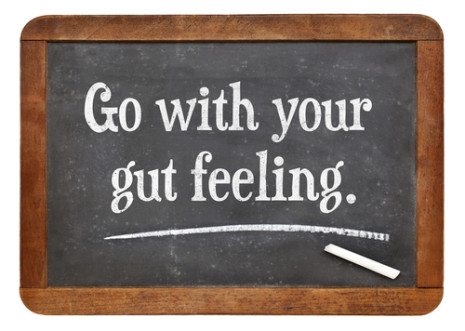
Have a “Gut Feeling?” That’s Your Second Brain at Work!
You know how it feels to have butterflies in your stomach when you’re nervous or excited, or to be grumpy and out of sorts thanks to an upset stomach.
This is part of a complex response to adrenaline production. Adrenaline is a hormone that creates your body’s “fight or flight” response when you’re confronted with a stressful situation. In more primitive times, this was crucial to human survival. Nowadays it’s not, but it’s no less important now than it was back then.
Dr. Emeran A. Mayer— professor of medicine, physiology and psychiatry at the University of California, Los Angeles— thinks that our emotions are more influenced by our gut than we may think. He writes:
“Recent neurobiological insights into gut-brain crosstalk have revealed a complex, bidirectional communication system that not only ensures the proper maintenance of gastrointestinal homeostasis and digestion, but is likely to have multiple effects on affect, motivation and higher cognitive functions, including intuitive decision making. Moreover, disturbances of this system have been implicated in a wide range of disorders, including functional and inflammatory gastrointestinal disorders, obesity and eating disorders.” [3]
In short, this means that the communication between your gut and your brain not only affects your digestive health, but also your physical and mental health.
Your enteric nervous system actually makes use of more than 30 neurotransmitters— most of which are identical to the ones found in the brain. This includes neurotransmitters such as acetylcholine, dopamine and serotonin.
You may recognize serotonin and dopamine— these are both considered “happy” hormones and play a major part in regulating your mood and your metabolism.
Interestingly, more than 90 percent of the body’s serotonin exists in the gut, as well as about 50 percent of the body’s dopamine.
The Connection Between the Two Brains
Curious, Beauty? This information blew my mind when I started to really get into it, and I wondered:
- If our gut produces such a large quantity of these important brain chemicals, wouldn’t any attempt at regulating them be reflected in our gut function?
- Following that same line of reasoning— isn’t it possible that an unhealthy gut’s neurotransmitter production might be faulty? And if so, could that lead to many people suffering unnecessarily from disorders?
Not surprisingly, the answer is yes. The pathway to treating many disorders— ranging from anxiety and depression, IBS, and ulcers, all the way to Parkinson’s disease— may be hiding in the connection between the two brains.
When someone suffering from anxiety is treated with SSRIs like Prozac or Zoloft, it can actually reduce symptoms of Irritable Bowel Syndrome (IBS). In fact, some IBS patients who don’t even have anxiety or depression are successfully treated using these drugs.
While I am not here to discuss the pros and cons of pharmaceutical therapies or advocate for them— that’s between you and your doctor— I do think this information is crucial in illustrating the importance of a healthy gut in maintaining a healthier and happier you.
The Power of Comfort Food
Still not convinced that your gut health is tied to happiness? Then think about your favorite comfort food, Beauty.
Whether it’s a big, gooey bowl of mac and cheese, a heaping helping of biscuits and gravy, or a big, greasy slice of pizza, we all have certain foods that make us feel happy and at peace when we eat them.
If you’re craving comfort food as you’re reading this, then you’re proving my point! :)
Even the imagery associated with these types of food conjures up those feelings of happiness and well-being.
We actually experience a primitive emotional reward from simply imagining them.
This is because the neurohormones in your gut relay a reward message to your brain after you consume these foods.
Why Is Comfort Food So Irresistible?
A Belgian study found that the biggest source of comfort in comfort foods are fats. In fact, when introduced directly into the stomach through a tube— bypassing the sensory responses of sight, taste and smell— fatty acids were shown to elevate mood immediately as well as dramatically decrease the sensation of hunger. [4]
However, your gut brain is primitive and can’t tell the difference between healthy fats and unhealthy ones. Some fats are essential to a healthy diet though. This is because fat serves numerous functions in your body from supporting supple, glowing skin to protecting the nervous system.
That’s why it’s it’s so important to consume plenty of healthy fats in your diet and not the unhealthy fats you get in processed food, meat, and dairy. And after seeing how fats affect your mood and emotional well-being, you can simply make sure you are consuming the right amount of healthy fats in your diet.
Some of my favorite beauty and healthy fat sources are:
- Avocados
- Coconut oil
- Nuts— such as almonds or cashews
- Seeds— such as flax seeds, chia seeds, and pumpkin seeds
You really don’t need a lot of fat to get these benefits. Too much fat— especially the unhealthy kinds found in a lot of “comfort foods—” can actually clog up your system, slow your digestion and increase your risk of accelerated aging in general. It can also cause serious health problems like heart disease, obesity, and diabetes.
Looking for some healthy and guilt-free comfort food? Check out some of my recipes, Beauty! I know you’ll find something you like. :)

How To Trust Your Gut for Better Health
Long before I ever heard of these statistics or the study of gastrointestinal science, I developed a keen interest in gut health.
Everything I learned from my own experience with poor gut health pointed to the truth.
Maintaining a healthy gut microbiome is an important part of health, beauty, and a balanced lifestyle.
Once I started really focusing on balancing my own gut, my energy skyrocketed and my skin cleared up! Once I knew there was something to this whole gut thing, I became passionate about learning everything I could about what made up a healthy gut.
Keeping your gut clean and at peak performance is a primary goal in any healthy dietary program. And if you’ve read any of my books or have been part of the Solluna community for a while, then you know that I believe in ongoing cleanses to purify the blood and eliminate free radicals and destructive toxins.
Adjusting your lifestyle to support ongoing cleansing and detoxification simultaneously cleans out your system like a gentle sponge while promoting healthy eating.
The Benefits of Healthy Cleansing
Ongoing healthy cleanses can provide your entire body with so many amazing benefits— not just your digestion! A few of these include:
- Clearer skin
- Brighter eyes
- Shinier hair and stronger nails
- A healthier immune system
- A more flat, taut belly
You may be thinking— ongoing cleansing can do all this? It can, Beauty!
It’s because when your body is in its preferred alkaline state— versus being mired in acidosis— you will get sick less often. Any injuries you have will heal more quickly too. Not only that, but cleansing also offers powerful anti-aging protection by guarding your skin against the impurities and deficiencies that contribute to premature aging.
And who wouldn’t love to look and feel younger and more vibrant for longer? :)
How To Practice Healthy Cleansing
There are a lot of cleanses that advertise fast results and make big promises. But it’s very important that you avoid these, Beauty. Remember— if it seems too good to be true, then it probably is.
Cleanses that offer immediate results are not healthy— that’s why I recommend ongoing cleanses. They’re gentle enough to be done often, and won’t put your health in danger like fast cleanses can.
Here are a few ways that you can practice ongoing, healthy cleansing:
- Drink a Glowing Green Smoothie ® (GGS) each morning.
- Incorporating more beauty foods into your diet, like fresh organic fruits and veggies, whole grains, and healthy fats.
- At the same time, consume less acid-forming, difficult-to-digest foods. These include dairy, large amounts of animal protein, and processed foods.
- Take the right kind of supplements. Supplements like my Feel Good SBO+ Probiotics, Detoxy 2.0 and Digestive Enzymes can help keep your body free of toxins, and they’re safe enough to take regularly.
Your other daily routines— like your morning routine— are also a major part of healthy cleansing. It’s just as important to keep your mind and your emotions healthy as it is for your body.
Nurture Your Gut Microbiome
Cleansing is not the only way to promote gut health or overall health.
Your gut is an ecosystem all by itself— it’s called your gut microbiome, or gut microbiota.
The health of this ecosystem is dependent on the right balance of gut flora to keep it functioning at peak performance. And by “gut flora,” I don’t just mean the good bacteria. A healthy gut microbiota requires a balance of both good and bad bacteria to be at its best.
A healthy microbiome works with your digestive system to help the natural process of extracting the nutrients from your food and keep you regular. Your digestive system performs even more functions than that, including:
- Regulating your immune system
- Breaking down the foods you eat
- Correctly distributing the nutrients extracted from your food
- Eliminating their leftover by-products as waste
Your gut is working around the clock to power the amazing organism known as “you.” :)
Even if you’ve only ever consumed the best foods for your body, it would still be an awful lot to manage. But when you consider all the less-than-stellar food choices we can make on a daily basis, it’s a wonder our society isn’t even unhealthier than it already is!
Thankfully though, we’re more aware than ever of the link between our lifestyle, overall health, and longevity. This is why it’s so important to properly nourish your gut!
It’s essential that we understand that eating— an instinctive and necessary activity that every creature engages in for survival— is something we can look at a little more carefully. We should look at it with an eye toward the end goal, and not just the temporary pleasure it can offer.
We need to appreciate the bigger picture of responsible nutrition’s benefits. We also shouldn’t be afraid of healthy food, thinking it won’t taste good. On the contrary— healthy, gut-supporting food can and often does taste great!
What Is Your Gut Telling You?
So how can you maximize the payoff from a healthy gut? And how can you relieve some of the stress on your gut while reaping the reward of a healthier body and a happier state of mind? It’s actually super easy, Beauty.
Here are a few quick, easy-to-remember tips to help keep you on the right track:

1. Hydrate!
I cannot stress enough the importance of keeping your body well hydrated during the day.
Be mindful. Every move you make, every breath you take results in the loss of necessary water from your body.
Water loss can result in headaches and some muscle and joint pain. It’s also a leading cause of constipation. And having regular and healthy bowel movements is an extremely important aspect of your ongoing gut health and your overall beauty.
The best way to prevent dehydration, headaches, and constipation is to drink plenty of water. For women, this means drinking about 11.5 cups— or 2.7 liters— of fluids daily.
Try to drink water exclusively. But if you get bored with the taste of water and want some variety, here are other options you can try:
- Warm water with lemon— I recommend this when you wake up
- Coconut water
- Citrus— lemon or lime— water
- The Glowing Green Smoothie®— a great source of purified water!
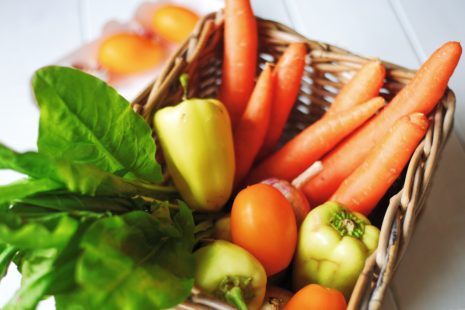
2. Cleanse
I talked about the importance of an ongoing cleansing regiment earlier, so I’ll keep this short! :)
Ongoing cleansing is vital to maintaining your gut health. You will also notice a boost in your overall mood as you rid your body of toxins.
An important aspect of an ongoing cleanse involves ridding your body of old decomposing food, which helps you to move toward newfound energy and vitality.
Eat lots of fiber-filled veggies at every meal. It’s one of the best ways to cleanse!
Of course, there is so much more you can do to keep your body cleansed and healthy. For more details on this ginormous topic, check out the “Light to Heavy and Beauty Food Pairing Principles” I outline in my book The Beauty Detox Solution.
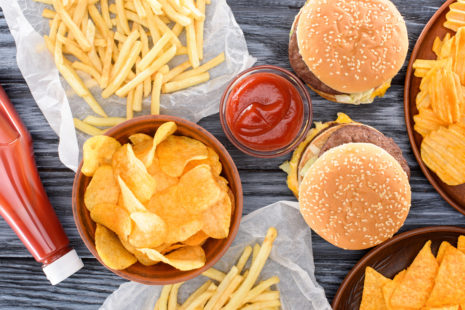
3. Eliminate Processed Foods
I really advocate for the elimination of processed foods from any diet or lifestyle. They are not only toxic in nature, but are also so addictive that they cause you to crave more of the food that’s so bad for you!
A diet filled with processed foods will leave you nutritionally depleted. It can also imbalance your gut bacteria, and can make you more likely to get sick.
Reserve your food dollars for products that are locally and organically grown. Your body and your gut will thank you!
I also recommend eating plenty of fermented foods. These amazing foods are not only high in vitamins, minerals and fiber, but they’re high in those healthy probiotics that keep you feeling great. A few examples of fermented food include:
- Kimchi
- Sauerkraut
- Dairy-free yogurt
- Pickled Vegetables
- Miso
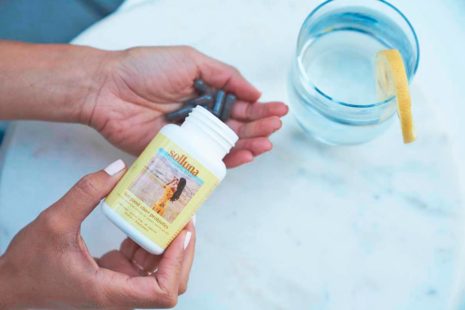
4. Use The Right Probiotic
Remember Beauty— your gut is its own mini-ecosystem, populated with more microorganisms than you can ever imagine. Each of them is carrying out their own role in keeping you healthy and free of diseases and infections.
Our diets are the farthest from nature than they have ever been in the history of humankind. Because of this, we rarely come into contact with the beneficial bacteria that populate a healthy gut. Eating local and organic can help reverse this.
I feel so strongly about the benefits of good probiotic supplements, and the need to access a product that you can trust. That’s why I created my own probiotic.
It includes soil-based organisms (SBOs) like the healthy bacteria literally found in the soil. SBOs are what our ancestors would naturally consume in trace amounts from their literally farm-to-table veggies. Mother Nature knows best!
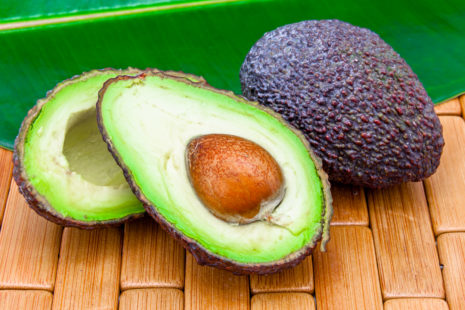
5. Balance Your Healthy Fats
It is absolutely okay to eat healthy fats— in moderation of course. Your body needs fat to perform many essential duties.
Remember— always look for foods that are high in healthy fats like chia seeds, nuts and avocados. You don’t have to overload your dishes with them, but work them into your salads and meals. The right fats make all the difference!
Your gut uses healthy fats to:
- Strengthen your immune system
- Aid in cell, tissue and joint repair
- Keep your skin healthy and radiant
- Keep your hair shiny and lustrous
Trusting your gut can help keep you out of a potentially bad situation, or even help guide you to something beautiful! This is true in life, and in wellness. Your gut knows what it needs, so trust it when it tells you something. :)
Here’s to your healthy— and beautiful— gut! Beauty comes in many forms. After learning about how important and hard-working our guts are, I think you would agree with me it is indeed a beautiful thing.
With love and gratitude,

Citations
- Rao, Meenakshi, and Michael D Gershon. “The Bowel and beyond: The Enteric Nervous System in Neurological Disorders.” Nature News, Nature Publishing Group, 20 July 2016, www.nature.com/articles/nrgastro.2016.107.
- Breit, Sigrid, et al. “Vagus Nerve as Modulator of the Brain-Gut Axis in Psychiatric and Inflammatory Disorders.” Frontiers, Frontiers, 13 Mar. 2018, www.frontiersin.org/articles/10.3389/fpsyt.2018.00044/full.
- Mayer, Emeran A. “Gut Feelings: The Emerging Biology of Gut-Brain Communication.” Nature Reviews. Neuroscience, U.S. National Library of Medicine, 13 July 2011, www.ncbi.nlm.nih.gov/pmc/articles/pmc3845678/.
- Boesmans, W, et al. “Brain-Derived Neurotrophic Factor Amplifies Neurotransmitter Responses and Promotes Synaptic Communication in the Enteric Nervous System.” Gut, BMJ Publishing Group, 1 Mar. 2008, gut.bmj.com/content/57/3/314.short.
The post Why You Should Always Go With Your Gut (When It Comes to Your Gut Health) appeared first on Solluna by Kimberly Snyder.
No comments:
Post a Comment